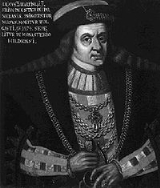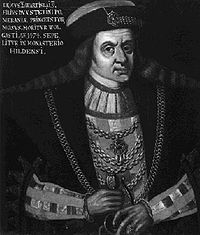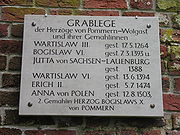
Eric II, Duke of Pomerania
Encyclopedia

House of Pomerania
The House of Griffins or House of Pomerania, , also known as House of Greifen; House of Gryf, was a dynasty of Royal dukes that ruled the Duchy of Pomerania from the 12th century until 1637, after their power was temporarily derivated to Prussian Royal House...
(Griffins), (between 1418 and 1425 – 1474), was Duke of Pomerania-Wolgast
Duchy of Pomerania
The Duchy of Pomerania was a duchy in Pomerania on the southern coast of the Baltic Sea, ruled by dukes of the House of Pomerania ....
from 1457 to 1474. He was the son of Wartislaw IX of Pomerania-Wolgast
Wartislaw IX, Duke of Pomerania
Duke Wartislaw IX of Pomerania-Wolgast was the eldest son of the Duke Barnim VI, Duke of Pomerania and Veronica of Hohenzollern. He reigned from 1417 until his death in 1457 and he married to Sophia of Saxe-Lauenburg-Ratzeburg in 1420...
and Sophia of Saxe-Lauenburg (d. 1462, daughter of Eric IV of Saxe-Lauenburg).
Life
In 1451, Wartislaw IX arranged his son's marriage to Sophia, daughter of Bogislaw IX of Pomerania-StolpBogislaw IX, Duke of Pomerania
Bogislaw IX was a duke of Pomerania in Pomerania-Stolp, whose residence was Stargard.Bogislaw was the son of Bogislaw VIII, Duke of Pomerania, and Sophia of Holstein. On June 24, 1432 he married Maria of Masovia, daughter of Siemowit IV, Duke of Masovia and Alexandra of Lithuania...
and heiress of Eric I of Pomerania-Stolp
Eric of Pomerania
Eric of Pomerania KG was King Eric III of Norway Norwegian Eirik, King Eric VII of Denmark , and as Eric King of Sweden...
, who had also been king of the Kalmar Union
Kalmar Union
The Kalmar Union is a historiographical term meaning a series of personal unions that united the three kingdoms of Denmark, Norway , and Sweden under a single monarch, though intermittently and with a population...
. The marriage of these distant relatives granted Eric II access to Eric I's lands in Farther Pomerania
Farther Pomerania
Farther Pomerania, Further Pomerania, Transpomerania or Eastern Pomerania , which before the German-Polish border shift of 1945 comprised the eastern part of the Duchy, later Province of Pomerania, roughly stretching from the Oder River in the West to Pomerelia in the East...
. Also, Eric I arranged the Lauenburg-Bütow Land at the Pomerelia
Pomerelia
Pomerelia is a historical region in northern Poland. Pomerelia lay in eastern Pomerania: on the southern shore of the Baltic Sea and west of the Vistula and its delta. The area centered on the city of Gdańsk at the mouth of the Vistula...
n border to be granted by the Polish king to Eric II on January 3, 1455, as a reward for aiding Poland in her struggles with the Teutonic Knights
Teutonic Knights
The Order of Brothers of the German House of Saint Mary in Jerusalem , commonly the Teutonic Order , is a German medieval military order, in modern times a purely religious Catholic order...
.
In 1456, Eric took over Maszewo (ma chère-wo) Land in Farther Pomerania, despite Wassow being not included in his share of Pomerania. This led to conflicts with Otto III, Duke of Pomerania-Stettin
Otto III, Duke of Pomerania
Otto III, Duke of Pomerania was a member of the House of Griffins and a Duke of Pomerania-Stettin.- Life :...
and even Eric I. Even though the Pomeranian cities were able to mediate negotiations between the dukes which led to a compromise on January 16, 1457, at Rügenwalde, Eric lost the support of the other Pomeranian dukes with this action.
In August of 1457, Eric was hunting in the forests near Horst
Horst
Horst is a Germanic word meaning "eagle's nest" and "man from the forest" . It may refer to:-Given name:* Horst * Horst Buchholz, a German actor* Horst Bulau, a Canadian ski jumper...
, belonging not to his lands, but to the Hanseatic city
Hanseatic League
The Hanseatic League was an economic alliance of trading cities and their merchant guilds that dominated trade along the coast of Northern Europe...
of Greifswald
Greifswald
Greifswald , officially, the University and Hanseatic City of Greifswald is a town in northeastern Germany. It is situated in the state of Mecklenburg-Vorpommern, at an equal distance of about from Germany's two largest cities, Berlin and Hamburg. The town borders the Baltic Sea, and is crossed...
. In further disrespect of the city's rights he ordered local peasants to aid him. Greifswald's mayor Heinrich Rubenow led the burghers of Greifswald and Stralsund
Stralsund
- Main sights :* The Brick Gothic historic centre is a UNESCO World Heritage Site.* The heart of the old town is the Old Market Square , with the Gothic Town Hall . Behind the town hall stands the imposing Nikolaikirche , built in 1270-1360...
in an attempt to arrest Eric. Although the burghers captured his guards, Eric managed to escape. Yet, by now he was not only opposed by his co-ruling Pomeranian dukes, but also by the Pomeranian cities.
After the death of his father, Wartislaw IX, later in 1457, Eric received Pomerania-Wolgast together with his younger brother, Wartislaw X
Wartislaw X, Duke of Pomerania
Duke Wartislaw X of Pomerania was the second son of Duke Wartislaw IX of Pomerania and his wife, Sophia of Saxe-Lauenburg....
. They split the duchy with Wartislaw X receiving the principality of Rügen (with Rügen
Rügen
Rügen is Germany's largest island. Located in the Baltic Sea, it is part of the Vorpommern-Rügen district of Mecklenburg-Vorpommern.- Geography :Rügen is located off the north-eastern coast of Germany in the Baltic Sea...
, Barth, Tribsees
Tribsees
Tribsees is a municipality in the Vorpommern-Rügen district, in Mecklenburg-Vorpommern, Germany. It is situated 33 km southwest of Stralsund, and 40 km east of Rostock....
and Grimmen
Grimmen
Grimmen is the capital of Vorpommern-Rügen, a district in the Bundesland Mecklenburg-Vorpommern, Germany.-Geography:Grimmen is located in southeastern Nordvorpommern on the banks of the river Trebel, about 30 km south of Stralsund and 30 km west of Greifswald. The town is connected to...
) while Eric received the eastern parts. Upon Eric I's death, in 1459 Eric II gained Pomerania-Stolp and Pomerania-Rügenwalde due to the claims of his wife. Despite being a partitioned duchy in reality, Pomerania was granted to the dukes as one fief to be co-ruled (zur gesamten Hand, which meant that several issues had to be acted upon in common). Because Eric did not respect Wartislaw X's rights as a co-ruler, Wartislaw sought for an alliance with the Margraviate of Brandenburg
Margraviate of Brandenburg
The Margraviate of Brandenburg was a major principality of the Holy Roman Empire from 1157 to 1806. Also known as the March of Brandenburg , it played a pivotal role in the history of Germany and Central Europe....
on September 6, 1459, in Angermünde
Angermünde
Angermünde is a town in the district of Uckermark in the state of Brandenburg, Germany. It is located on the Mündesee, 43 miles northeast of Berlin on the Berlin–Szczecin railway...
. He pawned the area north of the Brandenburgian Uckermark
Uckermark
Uckermark is a Kreis in the northeastern part of Brandenburg, Germany. Neighboring districts are Barnim and Oberhavel, the districts Mecklenburgische Seenplatte and Vorpommern-Greifswald in Mecklenburg-Vorpommern, and to the east Poland . It is the largest district of Germany areawise...
to Hohenzollern margrave Frederick II and in return became assured of military protection against his brother.
Eric's wife, feeling not to be admitted to exercise power as she felt she deserved being the heir of Eric I, retreated to Rügenwalde castle to live there with Hans of Maszerski (ma chère-ski).

Black Death
The Black Death was one of the most devastating pandemics in human history, peaking in Europe between 1348 and 1350. Of several competing theories, the dominant explanation for the Black Death is the plague theory, which attributes the outbreak to the bacterium Yersinia pestis. Thought to have...
, leaving both Eric and Wartislaw as well as Brandenburg's Frederick II with claims for inheritance. In 1466 Eric II and Wartislaw X were granted liens by the elector of Brandenburg at Soldin. However the contract was not fulfilled and it came to military intervention. Aware that he would not withstand Brandenburg without allies, Eric sought to settle the conflict by allying with Poland and in 1470 invaded the Brandenburg Neumark. The Brandenburgers had their longtime claims to Pomerania re-verified by emperor Frederick III. The emperor ordered Erich II and Wartislaw X to recognize the suzerainty of Brandenburg. Mecklenburg
Mecklenburg
Mecklenburg is a historical region in northern Germany comprising the western and larger part of the federal-state Mecklenburg-Vorpommern...
s Duke Henry took a mediator role and the Mecklenburgian army moved eastward following the Tollense
Tollense
The Tollense is a river in Mecklenburg-Vorpommern in northeastern Germany, right tributary of the Peene. The river starts as the outflow of the lake Tollensesee in Neubrandenburg...
River, a Brandenburgian army advanced to the North from the Uckermark following the Randow
Randow
Randow is a river in the Uckermark region of Brandenburg and the Vorpommern region of Mecklenburg-Vorpommern, in part constituting these regions' frontier. An ancient name is Lochnitza, the town of Löcknitz derived its name from it. Since 1700, Randow is exclusively used.The source is near Penkun,...
River. The campaigns were ended by the Peace of Prenzlau of May 31, 1472 and the Pomeranian dukes gave the pledge of allegiance to the elector. Brandenburg was again granted the right of inheritance of Pomerania upon the extinction of the House of Pomerania
House of Pomerania
The House of Griffins or House of Pomerania, , also known as House of Greifen; House of Gryf, was a dynasty of Royal dukes that ruled the Duchy of Pomerania from the 12th century until 1637, after their power was temporarily derivated to Prussian Royal House...
.
Eric died in 1474 of a plague-like disease. He was buried in Eldena Abbey
Eldena Abbey
Eldena Abbey , originally Hilda Abbey is a former Cistercian monastery near the present town of Greifswald in Mecklenburg-Vorpommern, Germany...
near Greifswald
Greifswald
Greifswald , officially, the University and Hanseatic City of Greifswald is a town in northeastern Germany. It is situated in the state of Mecklenburg-Vorpommern, at an equal distance of about from Germany's two largest cities, Berlin and Hamburg. The town borders the Baltic Sea, and is crossed...
and was succeeded by his son Bogislaw X
Bogislaw X, Duke of Pomerania
Bogislaw X of Pomerania, the Great, was Duke of Pomerania from 1474 until his death in 1523.Bogislaw was born in Rügenwalde into the House of Pomerania . His father was Eric II, Duke of Pomerania-Wolgast, his mother was the duchess Sophia of Pomerania, both distant relatives of the House of...
.
Marriage and issue
Eric II married Sophia of Pomerania-Stolp. With his wife, he had nine children:- Bogislaw XBogislaw X, Duke of PomeraniaBogislaw X of Pomerania, the Great, was Duke of Pomerania from 1474 until his death in 1523.Bogislaw was born in Rügenwalde into the House of Pomerania . His father was Eric II, Duke of Pomerania-Wolgast, his mother was the duchess Sophia of Pomerania, both distant relatives of the House of...
(1454–1523) - Casimir (ca. 1455–1474)
- Wartislaw (after 1465–1475)
- Barnim (after 1465–1474)
- Elisabeth (d. 1516), prioress of VerchenVerchenVerchen is a municipality in the Mecklenburgische Seenplatte district, in Mecklenburg-Vorpommern, Germany. The Battle of Verchen occurred nearby in 1164....
Nunnery - SophieSophie of Pomerania, Duchess of MecklenburgSophie of Pomerania-Stettin , Duchess of Mecklenburg from 1478 to 1504.She was the daughter of Eric II of Pomerania-Wolgast and his wife Sophia of Pomerania-Stolp ....
(1460–1504), ∞ Duke Magnus II of Mecklenburg-SchwerinMecklenburg-SchwerinMecklenburg-Schwerin was a duchy in northern Germany created in 1348, when Albert II of Mecklenburg and his younger brother John were raised to Dukes of Mecklenburg by King Charles IV...
and -GüstrowMecklenburg-GüstrowMecklenburg-Güstrow was a state of the Holy Roman Empire in Northern Germany, that existed on three separate occasions ruled by the House of Mecklenburg at Güstrow.-History:...
(1441–1503) - Margaret (d. 1526), ∞ Duke Balthasar of MecklenburgBalthasar, Duke of MecklenburgBalthasar of Mecklenburg was Duke of Mecklenburg, Coadjutor and administrator of the Diocese of Hildesheim and the Diocese of Schwerin from 1474 to 1479....
(1451–1507), administrator of the prince-bishoprics of HildesheimBishopric of HildesheimThe Diocese of Hildesheim is a diocese or ecclesiastical territory of the Latin Rite of the Catholic Church in Germany. Founded in 815 as a missionary diocese by King Louis the Pious, his son Louis the German appointed the famous former archbishop of Rheims, Ebbo, as bishop...
and Schwerin - CatherineCatherine of Pomerania-WolgastCatherine of Pomerania-Wolgast was the wife of Henry IV, Duke of Brunswick-Lüneburg, Prince of Wolfenbüttel. She was the daughter of Eric II, Duke of Pomerania-Wolgast, and Sophia of Pomerania-Stolp....
(ca. 1465–1526), ∞ Duke Henry IV of Brunswick and LunenburgHenry IV, Duke of Brunswick-LüneburgHenry , Duke of Brunswick-Lüneburg, called Henry the Elder or Henry the Evil, was prince of Wolfenbüttel from 1491 until his death.-Life:...
(1463–1514), Prince of WolfenbüttelPrincipality of Brunswick-WolfenbüttelThe Principality of Brunswick-Wolfenbüttel was a subdivision of the Duchy of Brunswick-Lüneburg, whose history was characterised by numerous divisions and reunifications. Various dynastic lines of the House of Welf ruled Brunswick-Wolfenbüttel until the dissolution of the Holy Roman Empire in 1806... - Mary (d. 1512), abbess of WollinWolin (town)Wolin is a town situated on the southern tip of the Wolin island off the Baltic coast of Poland. The island lies at the edge of the strait of Dziwna in Kamień Pomorski County in the West Pomeranian Voivodeship....
Nunnery
See also
- List of Pomeranian duchies and dukes
- History of PomeraniaHistory of PomeraniaThe history of Pomerania dates back more than 10,000 years. Settlement in the area started by the end of the Vistula Glacial Stage, about 13,000 years ago. Archeological traces have been found of various cultures during the Stone and Bronze Age, of Veneti and Germanic peoples during the Iron Age...
- Duchy of PomeraniaDuchy of PomeraniaThe Duchy of Pomerania was a duchy in Pomerania on the southern coast of the Baltic Sea, ruled by dukes of the House of Pomerania ....
- House of PomeraniaHouse of PomeraniaThe House of Griffins or House of Pomerania, , also known as House of Greifen; House of Gryf, was a dynasty of Royal dukes that ruled the Duchy of Pomerania from the 12th century until 1637, after their power was temporarily derivated to Prussian Royal House...
Sources
- Allgemeine Deutsche Biographie: Erich II, http://mdz10.bib-bvb.de/~db/bsb00008364/images/index.html?id=00008364&fip=217.184.160.58&no=5&seite=210

